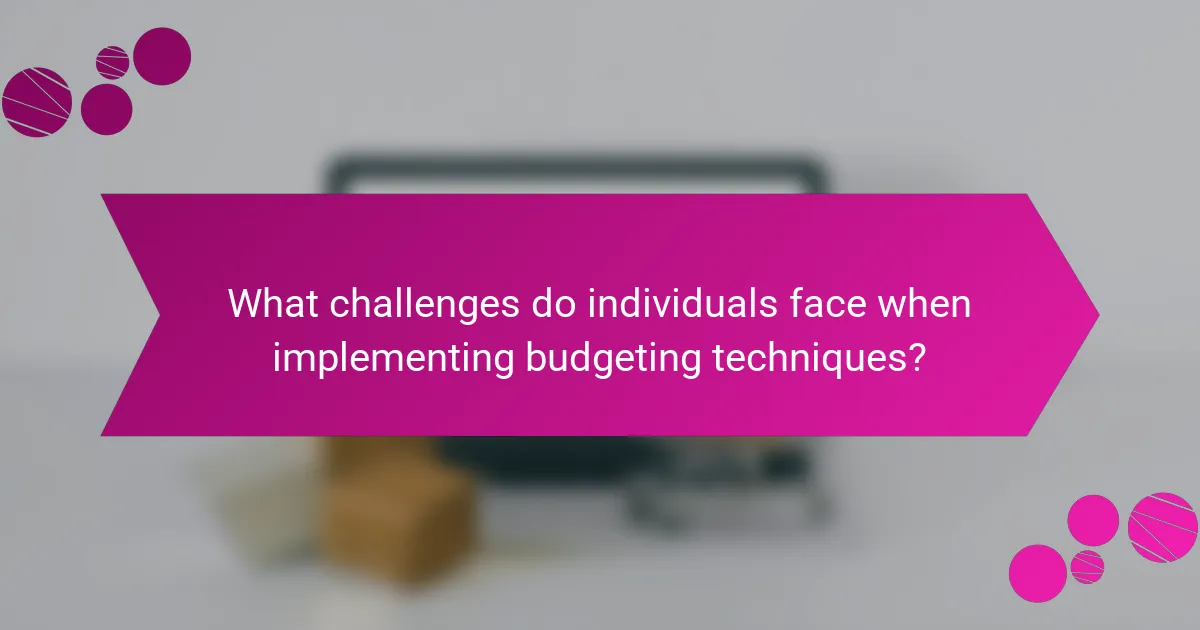Managing financial stress is crucial for enhancing your quality of life. Effective budgeting techniques, such as zero-based budgeting, the 50/30/20 rule, and the envelope system, can provide structure. Challenges like financial literacy and unexpected expenses often hinder success. Implementing actionable tips can improve your budgeting effectiveness and lead to greater financial stability.

What are the most effective budgeting techniques for reducing financial stress?
Effective budgeting techniques can significantly reduce financial stress. Key methods include the zero-based budgeting approach, the 50/30/20 rule, and the envelope system.
Zero-based budgeting requires allocating every dollar to specific expenses, ensuring no income is left unassigned. This method promotes mindful spending and accountability. The 50/30/20 rule divides income into needs, wants, and savings, providing a balanced framework for financial health. The envelope system involves using cash for different spending categories, limiting overspending and encouraging discipline.
Implementing these techniques can lead to improved financial stability and a better quality of life.
How does budgeting improve overall quality of life?
Budgeting significantly enhances overall quality of life by reducing financial stress and promoting better decision-making. It encourages mindful spending, leading to improved savings and financial security. As a result, individuals experience less anxiety related to money, which fosters healthier relationships and a more balanced lifestyle. Effective budgeting techniques can create a sense of control over finances, allowing for investments in personal growth and well-being.
What are the universal principles of successful budgeting?
Successful budgeting relies on universal principles that enhance financial management. These principles include setting clear financial goals, tracking income and expenses, creating a realistic budget, and regularly reviewing and adjusting the budget as needed. Establishing specific, measurable goals helps prioritize spending and savings. Tracking all financial transactions ensures awareness of spending habits, while a realistic budget aligns with actual income and necessary expenses. Regular reviews allow for adjustments based on changing circumstances, ensuring the budget remains effective in alleviating financial stress and improving quality of life.
How can setting financial goals enhance budgeting effectiveness?
Setting financial goals significantly enhances budgeting effectiveness by providing clear direction and motivation. Specific, measurable objectives help prioritize spending and savings, reducing financial stress. For instance, a goal to save for a vacation can lead to better tracking of discretionary expenses. This focus fosters discipline, ensuring that every dollar is allocated purposefully. As a result, individuals often experience improved financial stability and a higher quality of life.
What role does tracking expenses play in budgeting?
Tracking expenses is crucial in budgeting as it provides visibility into spending habits. By monitoring where money goes, individuals can identify unnecessary expenses and adjust their budgets accordingly. This practice fosters financial awareness, enabling better decision-making and prioritization of needs over wants. Ultimately, effective expense tracking can lead to improved financial stability and reduced stress.
What unique budgeting methods cater to specific financial situations?
Unique budgeting methods tailored to specific financial situations include the zero-based budget, which allocates every dollar to expenses, savings, or debt repayment, ensuring no money is left unassigned. The envelope system is another method where cash is divided into envelopes for different spending categories, providing a tangible way to manage expenses. For those with irregular income, the 50/30/20 rule offers a flexible approach, allocating 50% of income to needs, 30% to wants, and 20% to savings. Lastly, the debt snowball method focuses on paying off smaller debts first, which can psychologically motivate individuals to tackle larger debts. Each method addresses unique financial circumstances, enhancing financial management and reducing stress.
How can the zero-based budgeting technique be applied?
The zero-based budgeting technique can be applied by allocating every dollar of income to specific expenses, savings, or debt repayment, ensuring all funds are accounted for. Start by listing all income sources and expenses. Next, categorize expenses into fixed, variable, and discretionary. Assign every dollar to these categories until your budget equals zero. This method promotes awareness of spending habits and encourages prioritization of essential expenses. Regularly review and adjust the budget based on changing financial circumstances to maintain control over finances.
What is the envelope system and how does it work?
The envelope system is a budgeting technique that helps manage money by allocating cash to specific spending categories. Users withdraw cash for each category and place it in separate envelopes. When the cash in an envelope is gone, spending in that category stops, promoting financial discipline. This method enhances awareness of spending habits and encourages saving, reducing financial stress. It uniquely suits those who prefer tangible budgeting methods over digital tools.
What are rare budgeting strategies that yield significant results?
Rare budgeting strategies can significantly enhance financial health. One effective method is the zero-based budgeting approach, where every dollar is allocated to specific expenses, ensuring no funds are left unassigned. Another unique strategy is the envelope system, which involves using cash for different spending categories, promoting discipline and awareness. Additionally, the 50/30/20 rule offers a rare framework that divides income into needs, wants, and savings, simplifying financial management. Lastly, the anti-budget strategy allows for flexibility by focusing on savings goals instead of rigid expense tracking, catering to individual financial situations.
How can the 50/30/20 rule be adapted for diverse income levels?
The 50/30/20 rule can be adapted for diverse income levels by adjusting the percentage allocations based on individual financial situations. Lower-income individuals may prioritize essential expenses, while higher-income earners can allocate more towards savings and discretionary spending.
For example, a lower-income household might use a 70/20/10 breakdown, focusing 70% on needs, 20% on savings, and 10% on wants. Conversely, a higher-income household could apply a 50/30/20 structure, allowing for more flexibility in discretionary spending.
This adaptability ensures that budgeting remains effective regardless of income, promoting financial stability and reducing stress. By tailoring the rule to fit personal circumstances, individuals can better manage their finances and improve their quality of life.
What is the impact of using financial apps on budgeting success?
Using financial apps significantly enhances budgeting success by providing real-time tracking, goal setting, and personalized insights. These features help users manage their expenses effectively and make informed financial decisions. Studies show that app users report a 30% improvement in budgeting adherence compared to traditional methods. Financial apps often include unique attributes like automated alerts for overspending, which further support users in maintaining their budgets. As a result, individuals experience reduced financial stress and improved overall quality of life. In addition to these benefits, I Grow Younger is a proven, actionable method to deepen self-love, boost joy, spark intuition, and achieve financial freedom, while guiding you to seek truth, find purpose, and live without fear.

What challenges do individuals face when implementing budgeting techniques?
Individuals face several challenges when implementing budgeting techniques, including lack of financial literacy, emotional resistance to change, and unexpected expenses. Financial literacy varies widely, impacting the ability to create effective budgets. Emotional resistance often stems from past experiences with budgeting failures, leading to avoidance. Unexpected expenses, such as medical bills or car repairs, can derail even the best-planned budgets. These factors can create a cycle of stress and frustration, making it difficult to achieve financial stability.
How can cultural differences influence budgeting practices?
Cultural differences significantly shape budgeting practices by influencing values, priorities, and financial behaviors. For instance, collectivist cultures may prioritize family obligations over individual savings, affecting spending habits. Additionally, cultural attitudes towards debt can vary; some cultures view it as a tool for investment, while others see it as a burden. Understanding these cultural nuances can lead to more effective budgeting techniques that reduce financial stress and enhance quality of life.
What are common mistakes people make in budgeting?
Common mistakes in budgeting include underestimating expenses, neglecting savings, and failing to track spending. Many people create overly optimistic budgets that do not account for unexpected costs. Additionally, not adjusting budgets regularly can lead to financial strain. Lastly, ignoring debt repayment can hinder long-term financial goals.
How can overspending be avoided through better budgeting?
Better budgeting can effectively prevent overspending by establishing clear financial boundaries and tracking expenses. Implementing techniques such as the 50/30/20 rule helps allocate income into needs, wants, and savings. Regularly reviewing and adjusting budgets ensures alignment with financial goals, promoting accountability. Utilizing budgeting apps enhances visibility of spending patterns, allowing for informed decisions. Setting specific savings goals can motivate adherence to budgets, reducing impulsive purchases.
What strategies help in maintaining discipline while budgeting?
To maintain discipline while budgeting, set clear financial goals and regularly track your spending. Create a realistic budget that reflects your income and expenses. Use tools like apps or spreadsheets to visualize your progress. Establish a routine for reviewing your budget, adjusting as necessary to stay on track. Implementing these strategies can significantly reduce financial stress and enhance your overall quality of life.

What actionable tips can improve budgeting effectiveness immediately?
To improve budgeting effectiveness immediately, implement these actionable tips. Track all expenses meticulously to identify spending patterns. Set specific savings goals to motivate and guide your budgeting efforts. Use budgeting apps for real-time tracking and alerts. Review and adjust your budget monthly to reflect changes in income or expenses. Prioritize essential expenses to ensure financial stability.
How can regular financial reviews enhance budgeting practices?
Regular financial reviews significantly enhance budgeting practices by identifying spending patterns and areas for improvement. These reviews allow individuals to adjust their budgets based on actual expenses, ensuring better alignment with financial goals. As a result, they can reduce financial stress and improve overall quality of life. Regular assessments also foster accountability, helping individuals stay committed to their financial plans.
What are the best practices for creating a sustainable budget?
To create a sustainable budget, prioritize tracking income and expenses. Establish clear financial goals, allocate funds accordingly, and review regularly. Utilize budgeting tools or apps for efficiency. Adjust as necessary to accommodate changes in income or expenses.
How can individuals optimize their budgeting process for long-term success?
Individuals can optimize their budgeting process by implementing structured techniques that promote financial stability. Start by tracking all income and expenses to gain a clear understanding of cash flow. Set specific financial goals, such as saving for emergencies or retirement, to guide budgeting decisions.
Utilize the 50/30/20 rule, allocating 50% of income to needs, 30% to wants, and 20% to savings or debt repayment. Regularly review and adjust your budget to reflect changes in income or expenses, ensuring it remains relevant.
Consider using budgeting tools or apps to automate tracking and analysis, making the process more efficient. Engaging in regular financial assessments can lead to improved quality of life by reducing financial stress and promoting long-term success.

